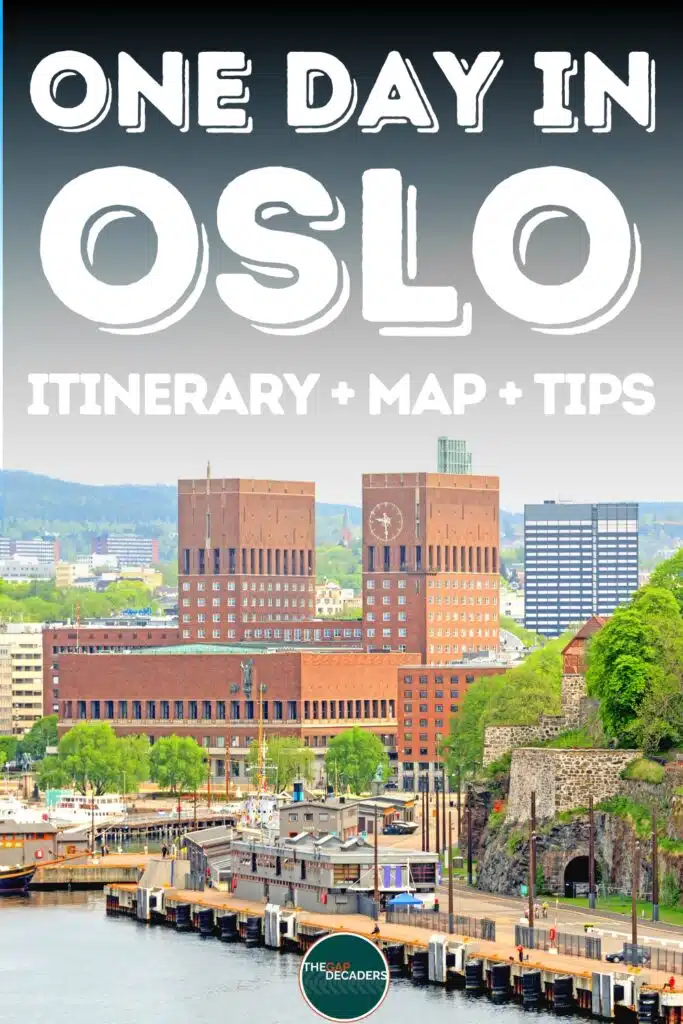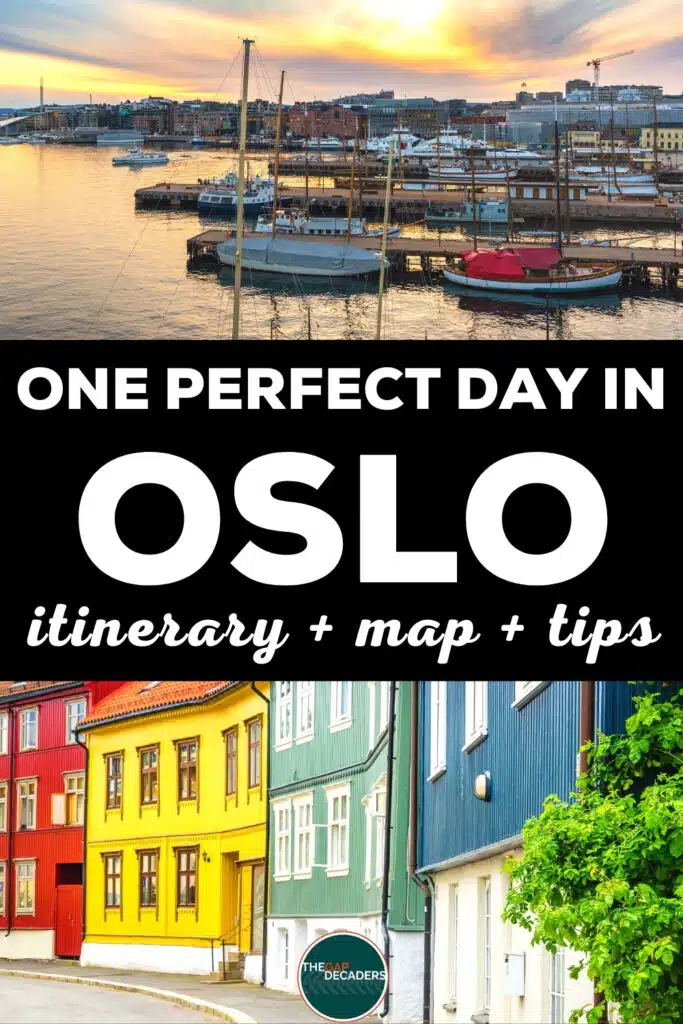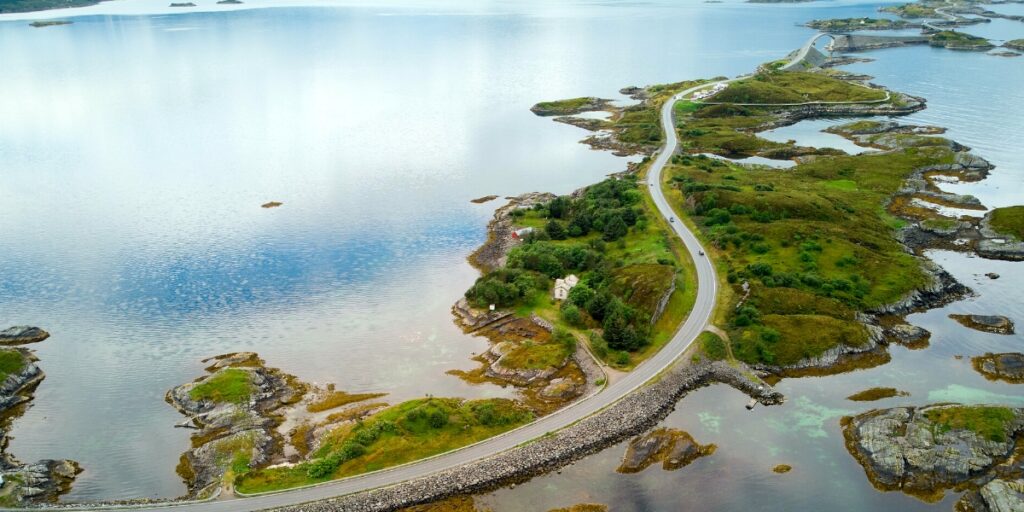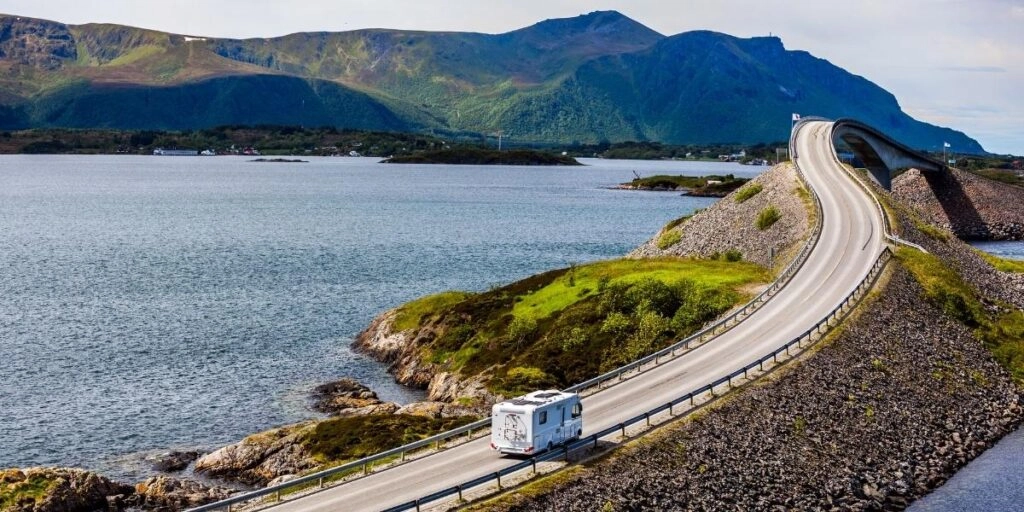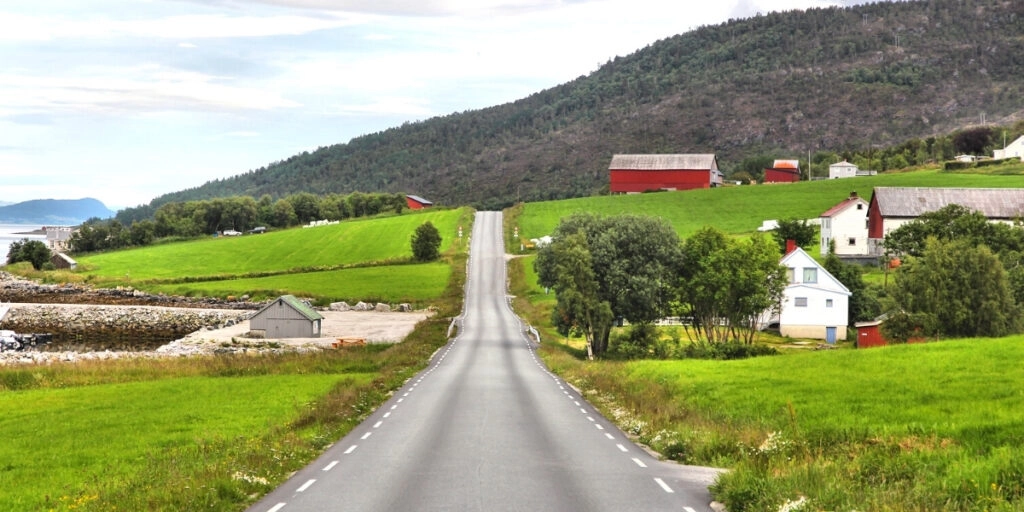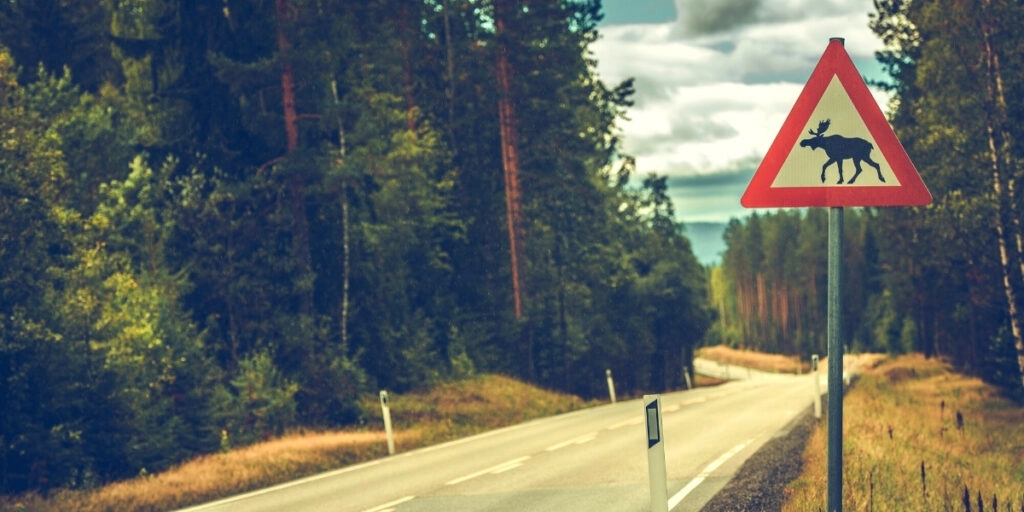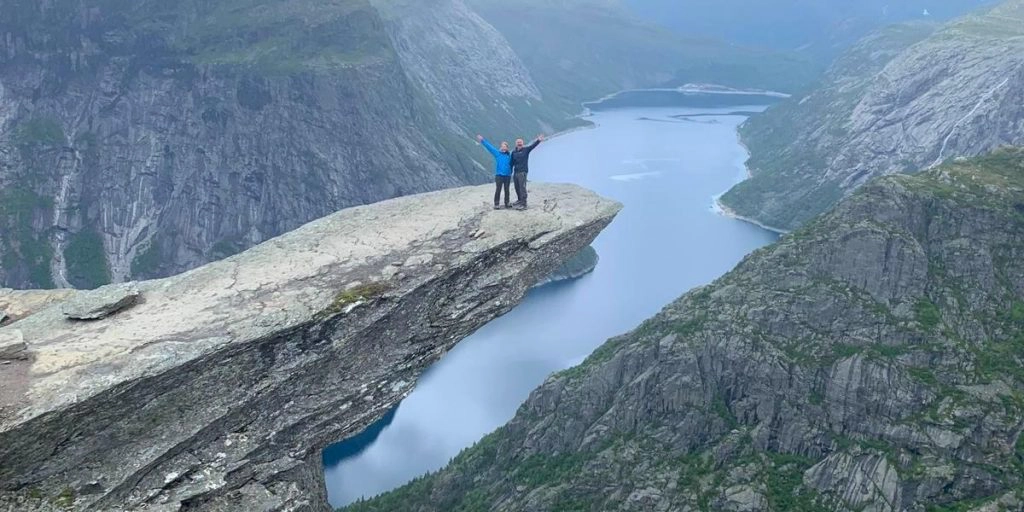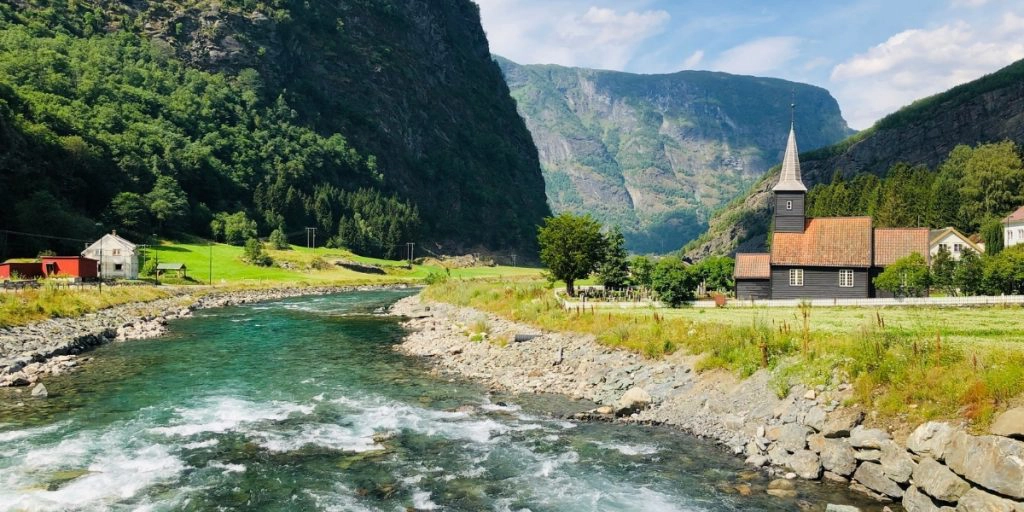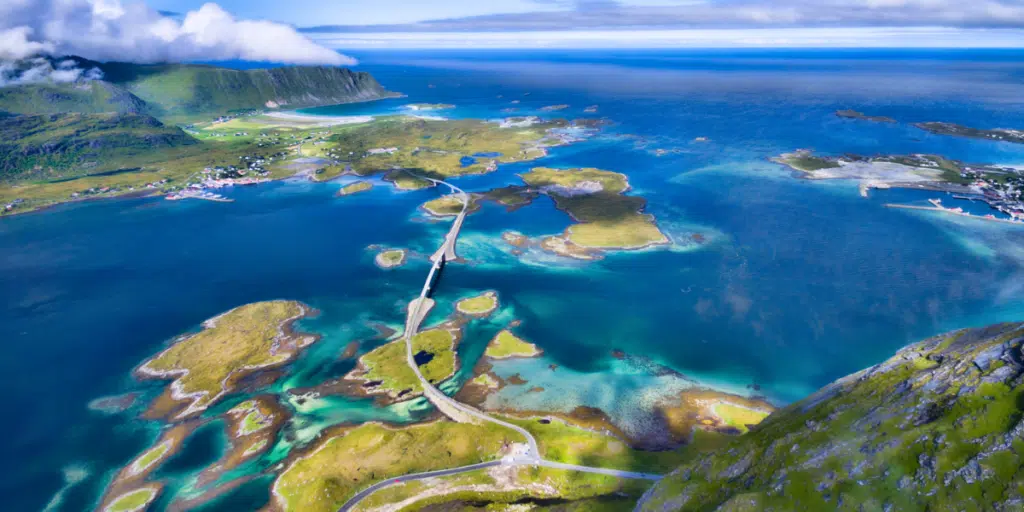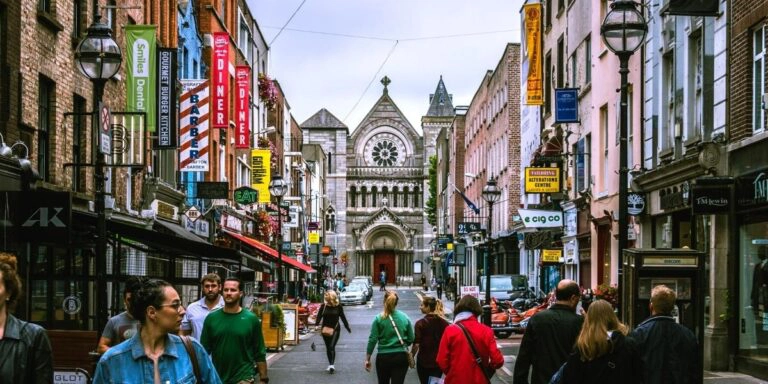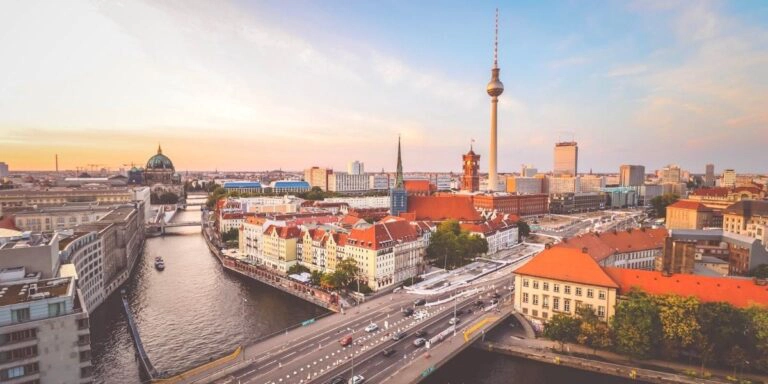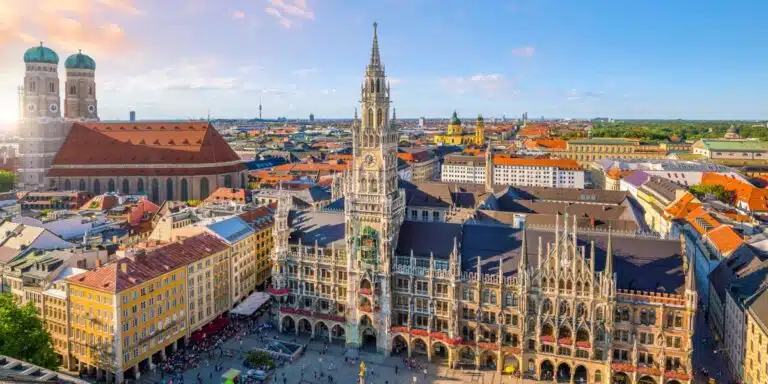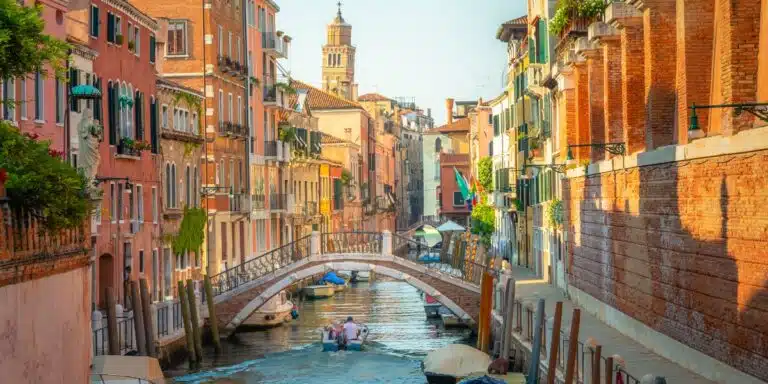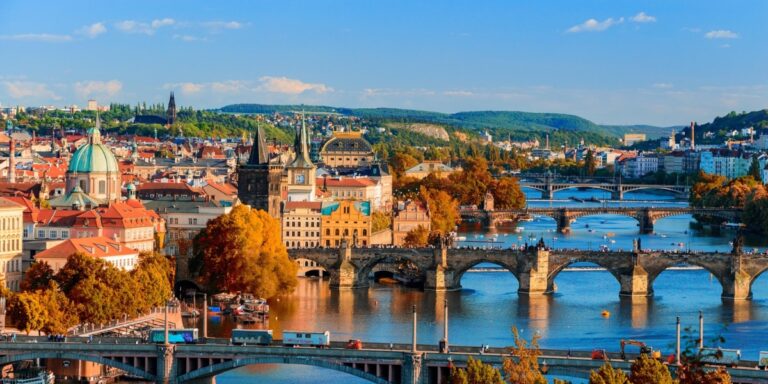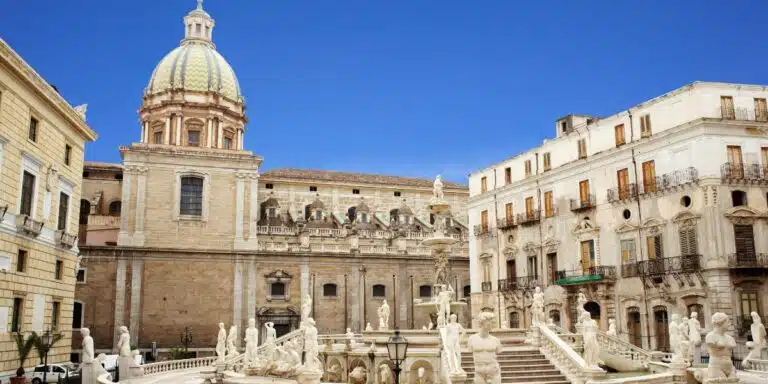This post may contain affiliate links, from which we earn an income. Click here to read our affiliate policy.
How to Spend One Day in Oslo
Oslo, the capital of Norway, is located on the beautiful Oslofjord, surrounded by mountains and water. Oslo is a cultured and fun city, with architecture both historical and modern, a growing gastro scene, and plenty of vibrant green spaces.
Packed with remarkable attractions, we’ll show you Oslo’s cool melding of Scandinavian architecture, fjord side attractions, grand boulevards, Viking churches, and world-class art museums, with our one-day Oslo itinerary.
In this Oslo travel guide, you’ll find a complete one day itinerary of all the most important must-see Oslo attractions, with an interactive map, organized to make the best use of your time. We also share recommendations for central places to stay, ideas about where to eat local food, and tips about how to make the most of your perfect day in Oslo.
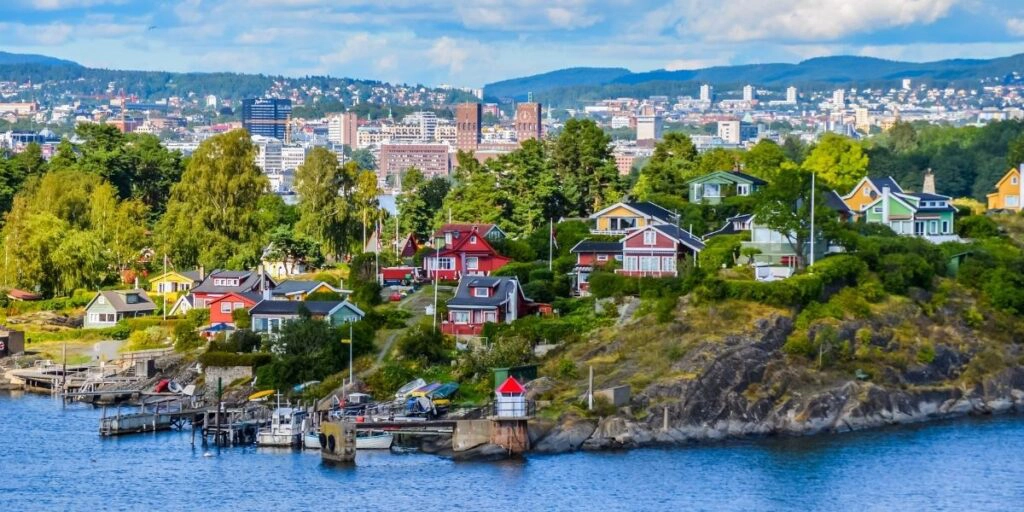
Are you planning your trip to Oslo last minute?
Be sure to book your accommodation and tours in Oslo ahead of time to ensure availability! Here are our top picks!
- Luxury: Amerikalinjen (lively and right in the center)
- Mid-Range: Clarion Hotel The Hub (stylish and well located, we loved it!)
- Budget: Citybox Oslo (light and bright value for money)
- Hostel: Anker Hostel (centrally located at a great price)
- For all the best things to see in Oslo, grab this Oslo walking tour
- Get your Oslo Card, for free public transport and entry into top Oslo’s attractions.
- Take this brilliant Oslo urban treasures by bike tour to see more in less time!
- Take this Oslo street food guided walking tour to discover the flavors of Norway
- End your day with a magical Oslofjord cruise for a whole new perspective!
What to See & Do in Oslo
Interactive Map
ROUTE: Oslo Opera House – Oslo Cathedral – Karl Johans Gate – Eidsvolls Plass – Royal Palace – Oslo City Hall – Akershus Fortress – National Museum – Bygdøy Peninsula – Aker Brygge
How to use this map – Use your fingers (or computer mouse) to zoom in and out. Click or touch the icons to get more info about a place, and click the arrow in the box top left to open the index. To add to your own Google Maps account, click the star next to the title of the map.
Itinerary Notes
Morning
Climb on Oslo Opera House
The first thing you’ll want to do is visit the Opera House, and if you can make it there in time, you’ll enjoy a fantastic sunrise!
You can walk up to the roof, which slopes from ground level and has lovely views of the Oslofjord. To clarify, you’re allowed, and in fact encouraged, to walk up to the roof to see the views of the city!
The Oslo Opera House is made from glass and Carrara marble and has a variety of art installations to enjoy, such as the floating She Lies by Monica Bonvicini in the water below.
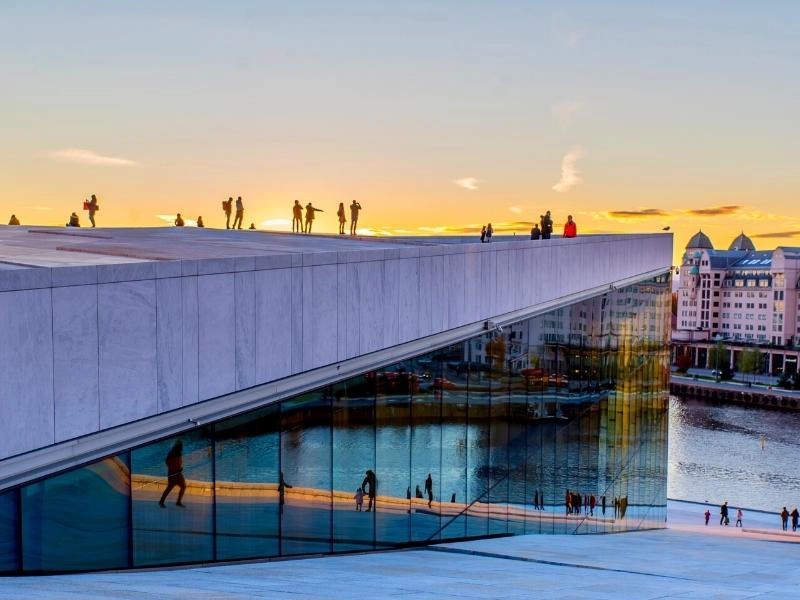
Visit Oslo Cathedral
Oslo Cathedral, or Oslo Domkirke, was first consecrated in 1697, and in 1950 it was restored to its original Dutch Baroque interior. The cathedral was closed again in 2006 for further restoration and re-opened in 2010.
King Harald V of Norway and the Norwegian royal family use the cathedral for weddings and funerals, with Prince Haakon and Princess Mette-Marit Tjessem Høiby most recently using it for their wedding in 2001.
Today, the beautiful cathedral symbolizes a blend of Oslo’s old and contemporary history, architecture, and artwork.
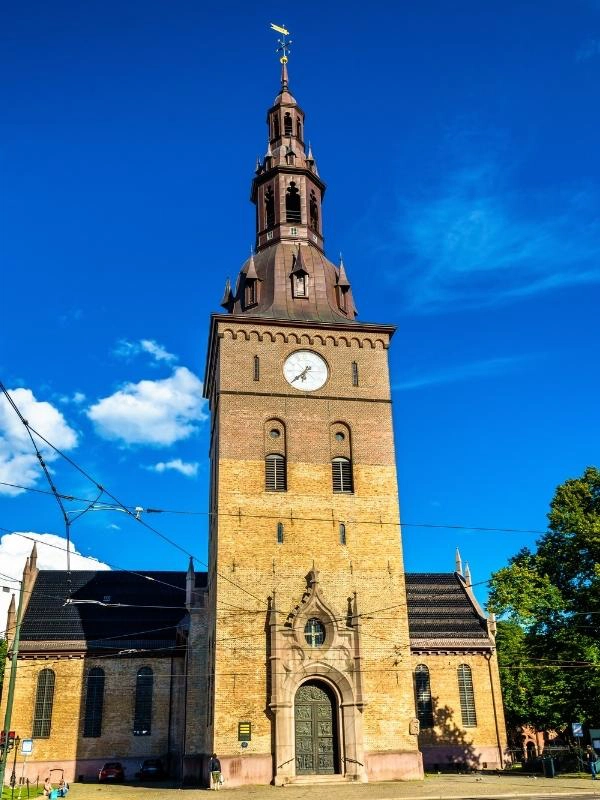
Window Shop on Karl Johans Gate
Do some window-shopping along the Johan Karl, Oslo’s main street, and pop into the variety of boutiques, coffee shops, and more. Be sure to check out the Freia store for delicious Norwegian chocolate, definitely the country’s most famous chocolate brand.
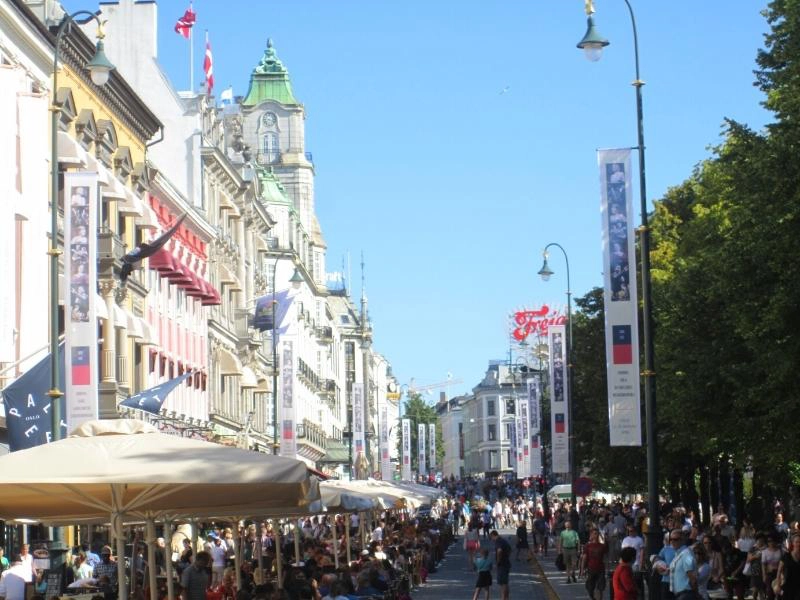
Stroll Eidsvolls Plass
This beautiful square and park in the city center, known as the ‘National Mall of Norway’, Eidsvolls Plass is home to the Stortinget, or Norwegian Parliament, buildings of the University of Oslo, the National Theater, and the Studenterlunden, or student’s grove.
TOP TIP: Spikersuppa Pond is a great place to practice ice skating, time permitting!
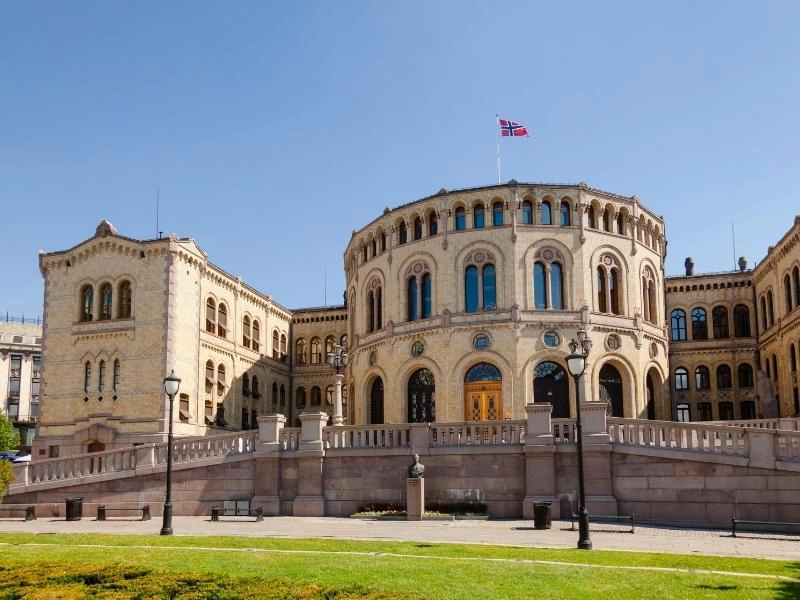
Explore the Royal Palace & Grounds
Explore the Palace Park, Palace Square, and Royal Palace area, at the end of Karl Johans Gate. The home of the Norwegian royal family who still live here full-time, the palace becomes one of Oslo’s best free attractions in the summer when it’s open for guided tours.
TOP TIP: A real Oslo must see is the changing of the guard that happens at 1.30pm every day, all year round, come rain or shine!
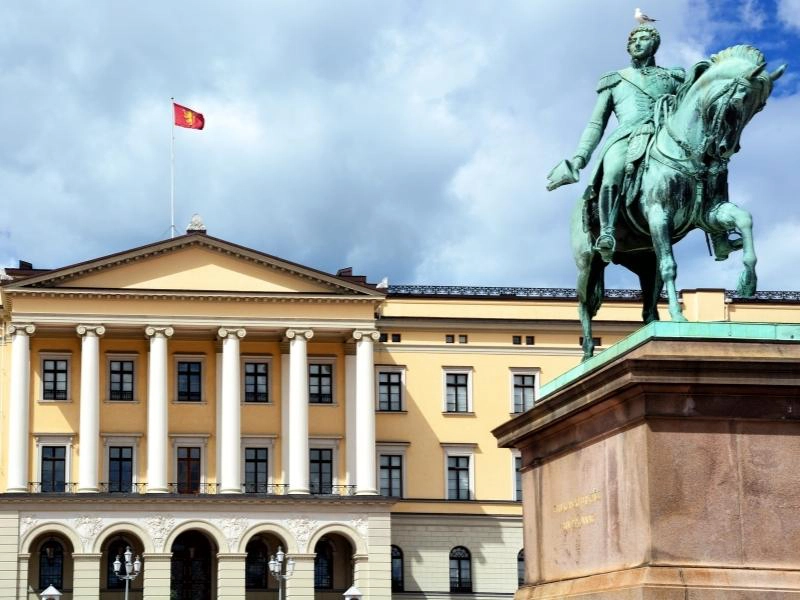
Stop at Oslo City Hall
Oslo City Hall, or Rådhuset, is home to the city’s administrative body and City Council. The whole Pipervika area was renovated and rebuilt to make room for the new city hall in the 1920s.
It took 30 years for City Hall to be built, including a pause in construction at the outbreak of World War II. In 1950, Oslo City Hall, designed in the Functionalism architectural style, was finally completed.
A large brutish building finished in clumpy brown brick, the City Hall can feel at odds with Oslo’s contemporary and minimalist Scandinavian architecture. Nevertheless, in 2005, Radhuset was dubbed Oslo’s ‘Structure of the Century’ and we do think it’s a beautiful building.
As well as being an administrative building, City Hall is the location of the Nobel Peace Prize Award ceremony and is also a museum of Norwegian art and culture, Oslo’s answer to London’s Tate Modern.
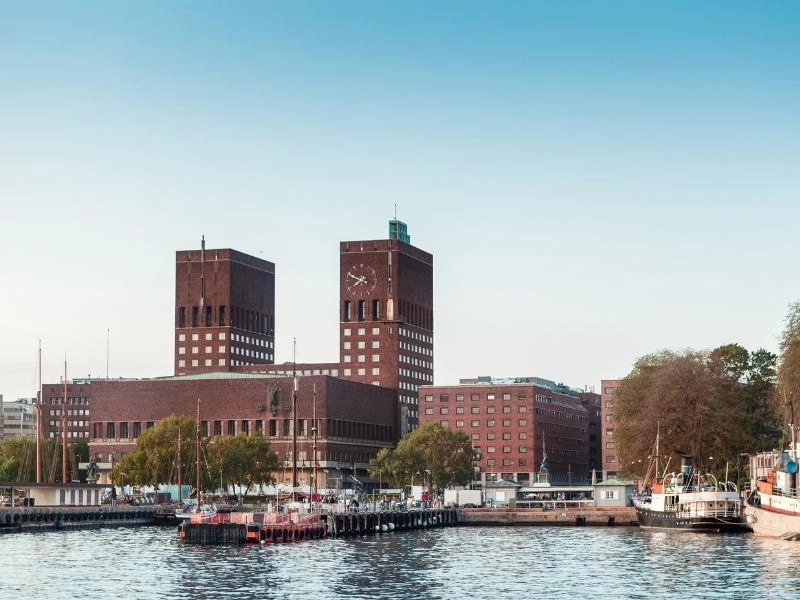
Afternoon
Visit the Akershus Fortress
Your first stop after lunch is the must-do Oslo attraction is Akershus, a medieval castle and fortress complex which dates back to the 13th century. Akershus Castle has worn several hats throughout its history, alternatively serving as the seat of county government of Akershus before it became a part of Oslo, a royal residence, a prison, and the Prime Minister’s office.
While you’re here, you can visit the fortress for free, or the palace for a NOK 70 fee. There are also a few museums, including the Norwegian Resistance Museum, on the fortress grounds, but if you are only in Oslo for a day, prioritize exploring the fortress portion.
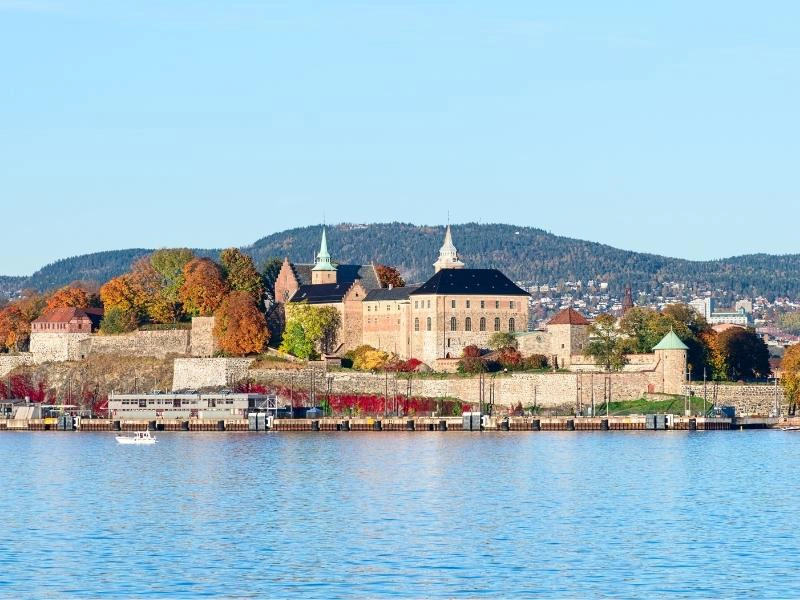
Take in the National Museum
The National Museum, the largest art museum in the Nordic countries, is a result of the Nasjonalgalleriet, or National Gallery joining forces with Oslo’s original National Museum.
The National Gallery closed temporarily in January of 2019, to facilitate a move of over 53,000 works of art to the new National Museum which opened in June 2022.
Today, the National Museum has replaced four previous buildings including the former National Gallery, and shows older and modern art, contemporary art, architecture, craft and design over 13,000 square meters of exhibition space. The ‘big grey box’ as it’s been dubbed by locals is larger than Bilbao’s Guggenheim and Amsterdam’s Rijksmuseum.
National Museum highlights include The Scream by Edvard Munch (and if you have time you should also visit the Munch Museum further east along the waterfront), the Norwegian fairytale room, and the reindeer skull curtain in the foyer, featuring 400 polished reindeer skulls, by Máret Ánne Sara.
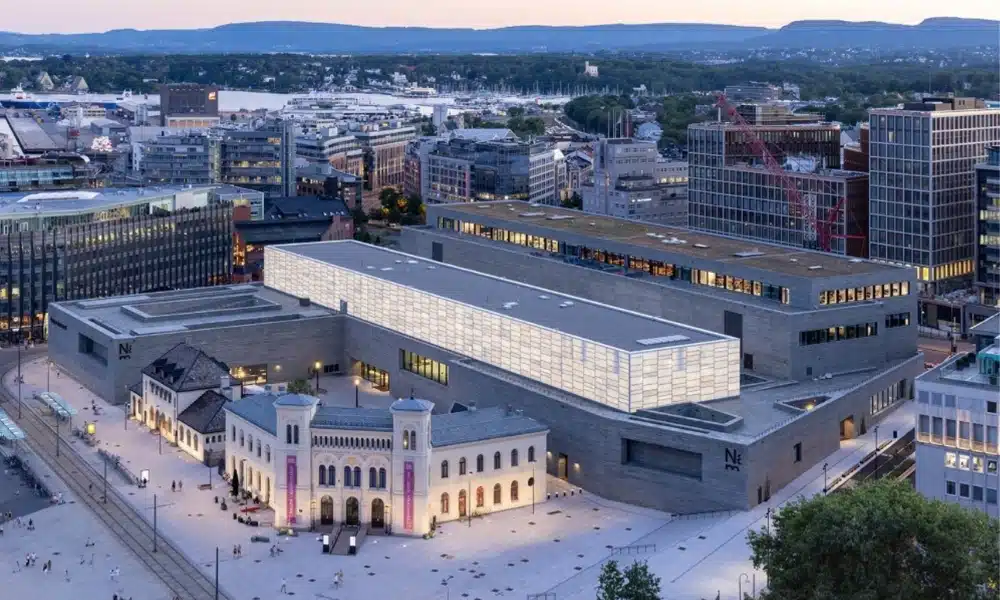
Explore the Bygdøy Peninsula
Catch the Bygdoyfergene, or boat to the museums. Operating between March and October, the ferry leaves City Hall Pier 3 every 30 minutes. The ferry is included in the Oslo Pass, which you can find out about below.
The Bygdoy Peninsula gives a real flavor of Viking life in Norway and has several beautiful beaches and lots of walking trails.
Norwegian Museum of Cultural History
The Norsk Folkemuseum is full of cultural history with large collections of artifacts from Sami and Viking folk cultures and incorporates a large open-air museum with more than 150 historic buildings, relocated from towns and rural districts.
The highlight of the open air museum is the Gol Stave Church which was originally built in Gol in the traditional region of Hallingdal between 1157 to 1216. Christian stave churches were once common in north-western Europe but the few that remain are mainly in Norway.
These medieval wooden buildings are so called because of the building’s structure of a post and lintel construction – a style of timber framing where the load-bearing posts are called stafr in Old Norse.
Viking Ship Museum
The Viking Ship Museum is closed and will open its doors as the Viking Age Museum in 2026/2027.
Vikings were gifted craftsmen and you’ll find genuine Viking vessels in the Viking Ship Museum, that were unearthed from burial mounds in Gokstad, Oseberg, and Tune dating back as far as 820 AD.
One of the most important discoveries from the Viking age is the Oseberg ship, a 9th century Viking ship that was discovered in 1903 on a farm in southeastern Norway and excavated from a burial mound in 1904 along with various elaborately decorated objects such as wooden sleighs, embroidered textiles, and other artifacts.
The Fram Museum
The Fram Museum tells the story of Norwegian polar exploration and the Polar Ship Fram, the strongest wooden ship ever built which holds the records for sailing farthest north and farthest south and has visited the Arctic, Greenland, and Antarctica on various expeditions in the 19th and 20th centuries.
Other Bygdoy Museums
You also have the Norwegian Maritime Museum, and finally, the Kon-Tiki Museum, dedicated to Thor Heyerdahl, who gained worldwide fame when he crossed the Pacific Ocean on the balsa wood raft Kon-Tiki in 1947.
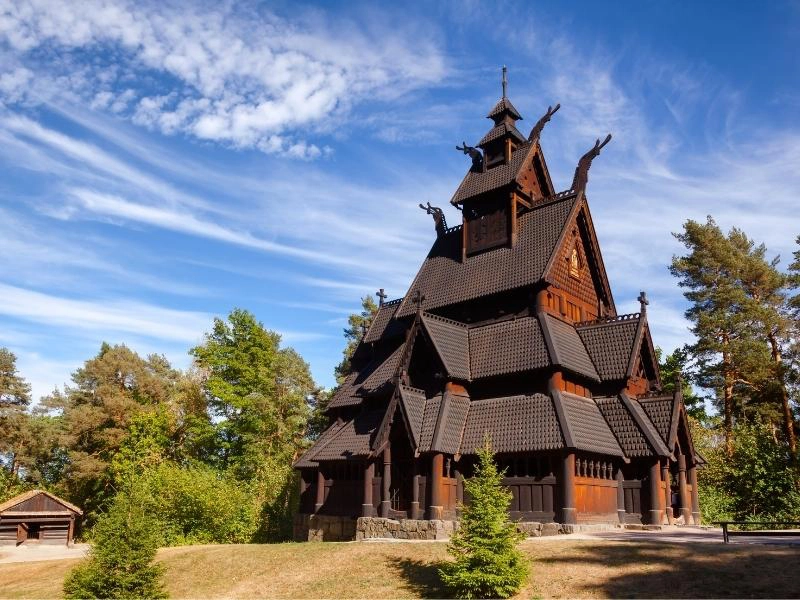
Evening
Explore Aker Brygge
Explore the hip and recently revitalized Aker Brygge. A former shipyard, the waterfront area has been totally remodeled, with sleek, glass buildings, eateries, and bars along the pier, which include a boat bar in the summertime, and a contemporary and modern shopping center.
The 9km Harbour Promenade, which starts in the old container dock at Sorenga and ends in Tjuvholmen, home to interesting architecture and a city beach. Highlights of the route include the Operastranda beach and Operahuset Oslo, the food, culture, and education center of Vippa Oslo, the Akershus Fortress, and Oslo City Hall.
In fact, the Harbour Promenade passes many of Oslo’s top spots and makes for a lively stroll with plenty of places to stop for coffee, beer, or food.
The Nobel Peace Prize Centre, a showcase for the Nobel Peace Prize and the ideals it represents, is located here, as well as Oslo’s Astrup Fearnley Museum of Modern Art.
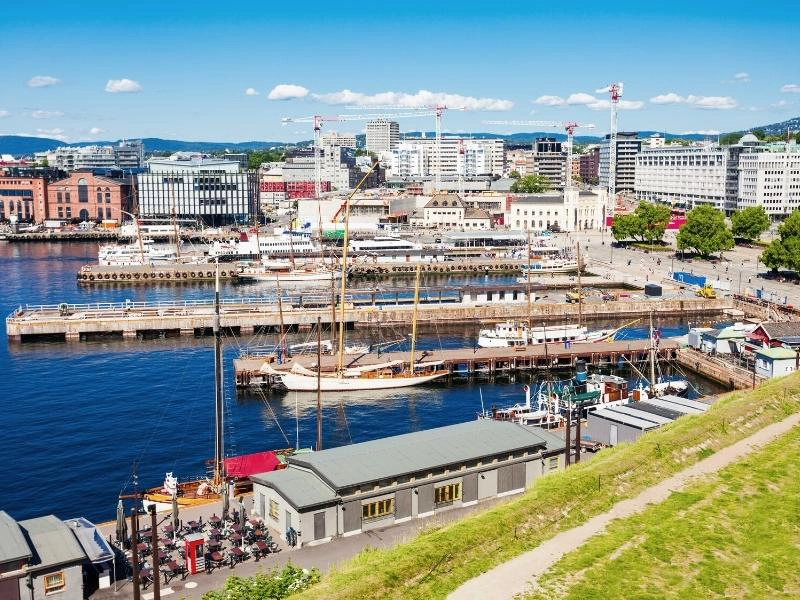
Take a Fjord Cruise
Explore the Oslofjord on an evening cruise. There’s no better way to see the city than from the water which surrounds it. Most cruises are on restored wooden ships, traditional to the region, although there are modern hybrid and electric boats cruising the water too!
On our recommended trip you’ll climb aboard a wooden sailing ship for a three hour evening cruise of the Oslo fjords. Sit back to enjoy the wonderful scenery as you savor the fresh flavor of fjord shrimps and seafood at a dinner buffet, with hot and cold drinks from the bar.
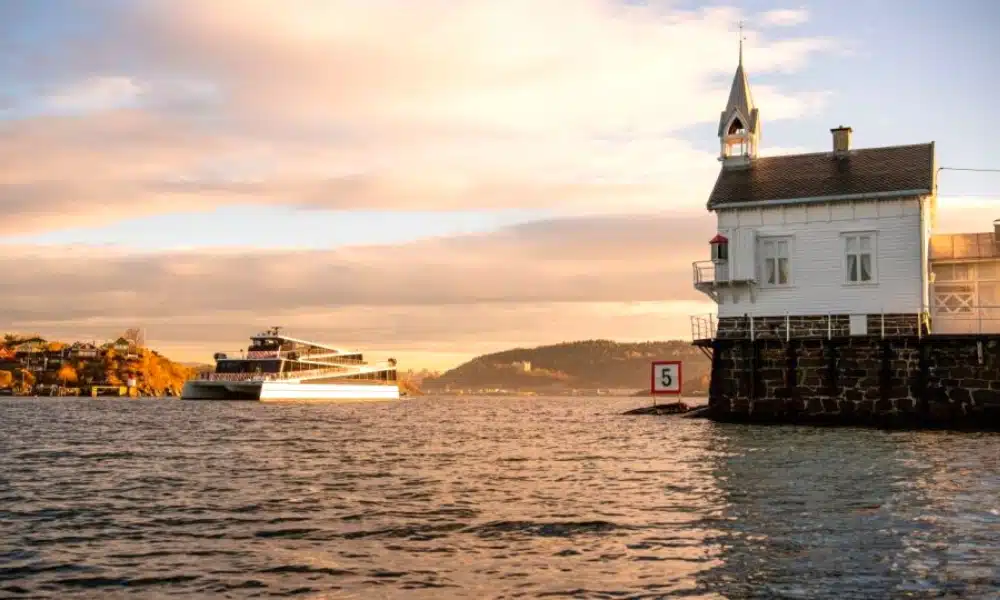
Where to Eat in Oslo
Following in the footsteps of Copenhagen and Stockholm, Oslo has developed into a culinary gem. Local and sustainable ingredients, classic Nordic seafood, and an emerging plant-based food scene have created a food lovers paradise with a wide variety of dining options.
Sample the Street Food
If you want to find out more about Norwegian street food, join this highly rated Oslo street cuisine guided tour that combines exploration of the city’s hidden gems and the places offering the most typical flavors of Oslo.
The Mathallen Food Hall
Along the banks of the Akerselva River in the up-and-coming Vulkan district is the Mathallen Food Hall, one of the best places to check out classic Norwegian fare.
It is a bit touristy but has over 30 stalls dedicated to Norwegian gastronomy, perfect for those only in the city for a short time.
TOP TIP: This is a perfect place for lunch or an early dinner, on weeknights it closes at 6pm and 8pm on Saturdays.
Kolonihagen Frogner
In the up-market district of Frogner is Kolonihagen, a neighborhood restaurant serving smaller plates and a Norwegian-focused tasting menu of natural, organic, and locally sourced ingredients.
With Scandi meets industrial decor and friendly service, this is an ideal place for dinner after a perfect day in Oslo.
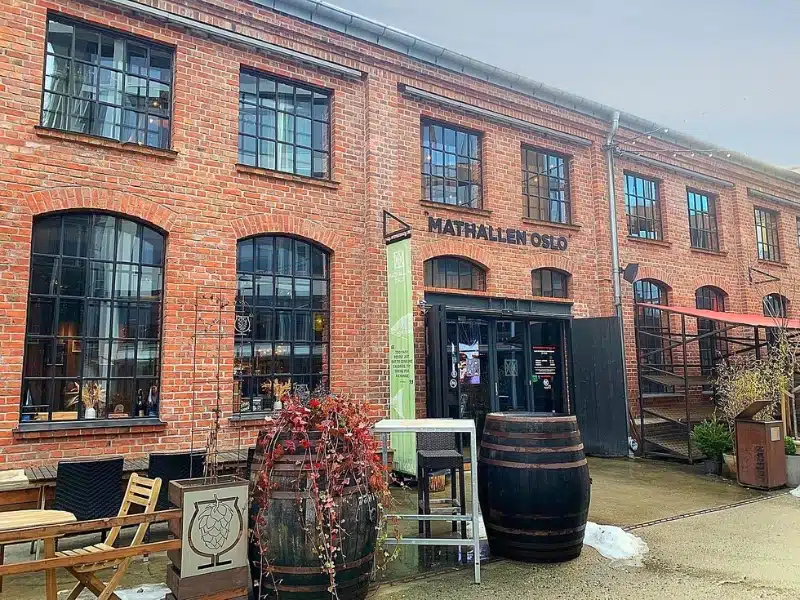
Norway Travel Ideas
Top Five Oslo Travel Tips
- If you’re visiting in winter, don’t miss the Christmas markets! Whilst not quite as cute as their counterparts in Austria or France, Oslo’s have a distinctly Nordic vibe that is simply adorable. You have two options: outdoor Jul i Vinterland (right by the Royal Palace), and indoor-outdoor Julemarked, on Youngstorget Street, a few blocks away. If you have time, absolutely meander through both! Jul i Vinterland has a Ferris Wheel, and both have stalls selling traditional winter goodies like juleglogg, a seasonal mulled wine drink, as well as lovely little nooks selling seasonal gifts like ornaments, scarves, and hats.
- Perhaps the biggest tip for Oslo (and Norway in general) at any time of year, but especially in the winter, spring, or fall, is that the weather can be very fickle. It’s best to wear solid, comfortable shoes that are somewhat water-resistant, pack layers such as long-sleeved shirts or sweaters, and have a rain jacket with you that’s easy to take on and off if the weather changes. Umbrellas can be bulky and hazardous if it gets windy, so something with a good hood is usually better.
- You won’t see the Northern Lights or any polar bears in the Norway capital – you need to go much further north for both.
- Oslo is a really bike-friendly city. Take this brilliant Oslo urban treasures by bike tour and get around the city faster, meaning even more sightseeing in Oslo!
- Oslo has a fantastic public transportation system, a network of trams, buses, metros, and even ferries, all connected on the same ticket! If you don’t have much time in the city, it may be worth getting the 24 hour Oslo Pass, which includes unlimited public transit in Zone 1 and admission to Oslo’s museums.
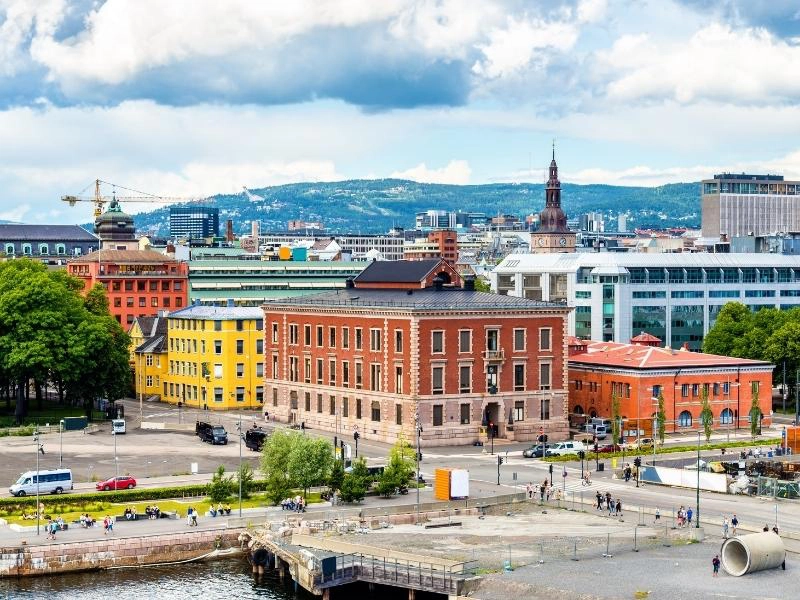
More Than One Day in Oslo
Do you have time to explore Oslo in two days? Or perhaps you have a long weekend or another half day? If so, add these top things to do in Oslo to your itinerary.
Explore Frogner Park
Take a day trip from Oslo to Frogner Park, home to the Vigeland Sculpture Park. Located about half an hour from the center of the city by tram, Vigeland Park is the world’s largest sculpture park made up of works from one single artist and a visit is a great opportunity to enjoy the green lungs of Oslo.
There are over 200 pieces by Gustav Vigeland, sculpted from 1924 to 1943 and later given to the city of Oslo. A lot of the sculptures are on the bizarre side, but well worth visiting. Make sure to find the Angry Boy, one of the best-known statues in the park, even though it’s the smallest!
Frogner Park itself is the largest park in Oslo and the former Frogner Manor House and Baroque garden are gorgeous, with the surrounding Frogner neighborhood being lovely for a wander on a sunny day.
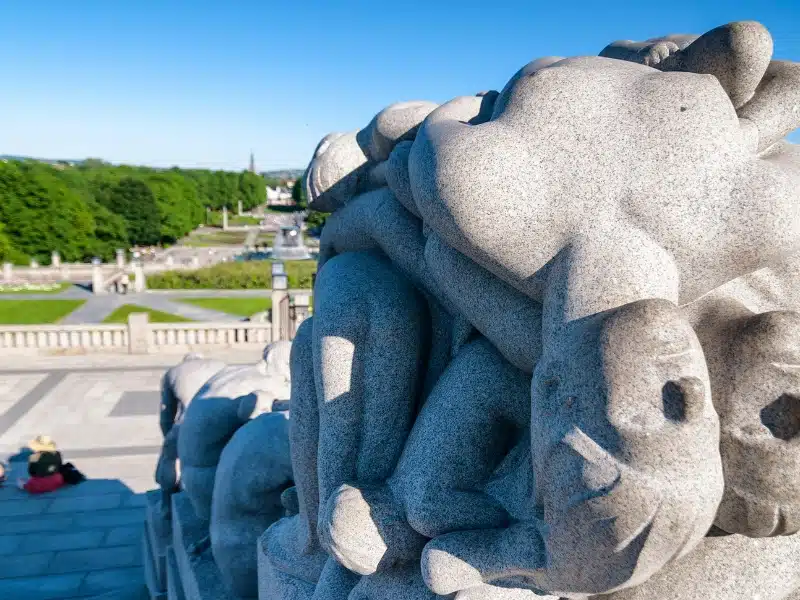
Explore Damstredet & Telthusbakken
Two adorable historic streets to check out are Damstredet and Telthusbakken. A mere 160 and 300 meters in length, respectively, both are charming and cobblestoned, reminiscent of times gone by.
Damstredet was once a shantytown, but its wooden houses survived, and are a great photo spot. Nearby, the Vår Frelsers cemetery is the final resting place of Norwegian greats like Henrik Ibsen and Edvard Munch.
Just a one minute walk from Telthusbakken is the medieval Gamle Aker Church, the oldest building in Norway, and nearby gardens.
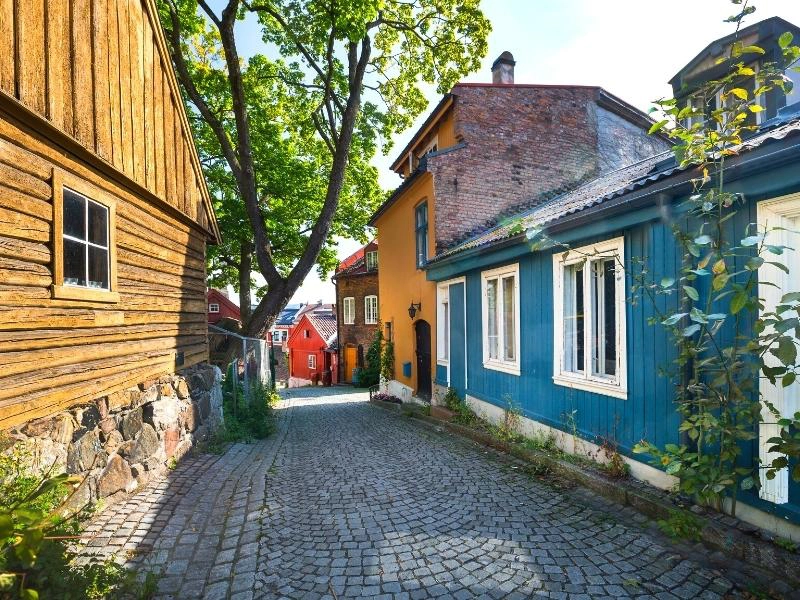
Holmenkollen Ski Museum
Located to the north of Oslo city center, the Holmenkollen Ski Museum tells the story of Norway’s skiing heritage delves deep into the history of skiing, covering everything from ancient rock carvings to cutting-edge modern sports equipment.
Adjacent to the museum is the famous Holmenkollbakken or Holmenkoll ski jump. This iconic structure is not merely a ski jump; it epitomizes Oslo’s sporting spirit and provides visitors with a unique glimpse of sporting history and breathtaking views from the observation deck on a clear day.
The legacy of the Holmenkollen ski jump traces back to 1892. Over time, the famous ski jump has undergone numerous renovations, been a site for the Winter Olympics, and is now a state-of-the-art facility.
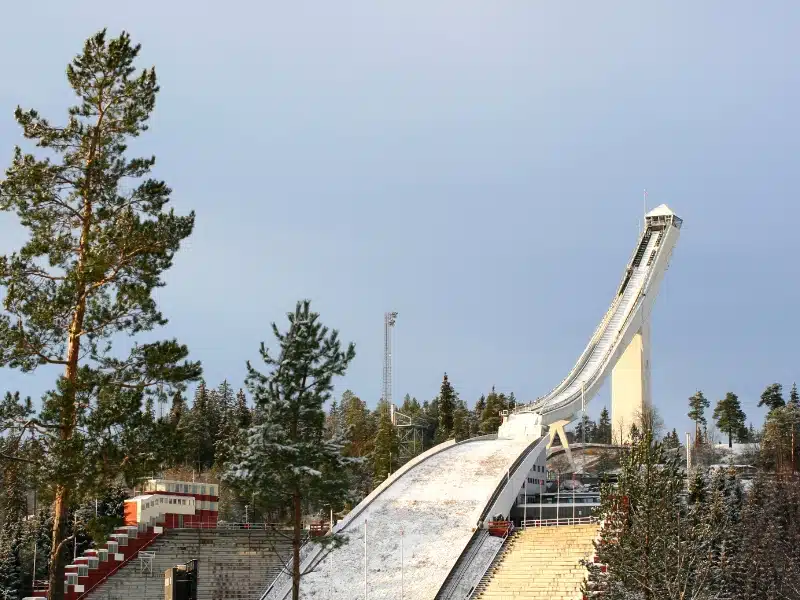
Discover Nordmarka
A mere tram ride away from Oslo and you’ll feel like you’re in a different world in Nordmarka, a massive outdoor recreation area on the city limits. This is where the locals come to enjoy hiking in the summer and cross-country skiing, snowshoeing, and other typical Norwegian activities in winter.
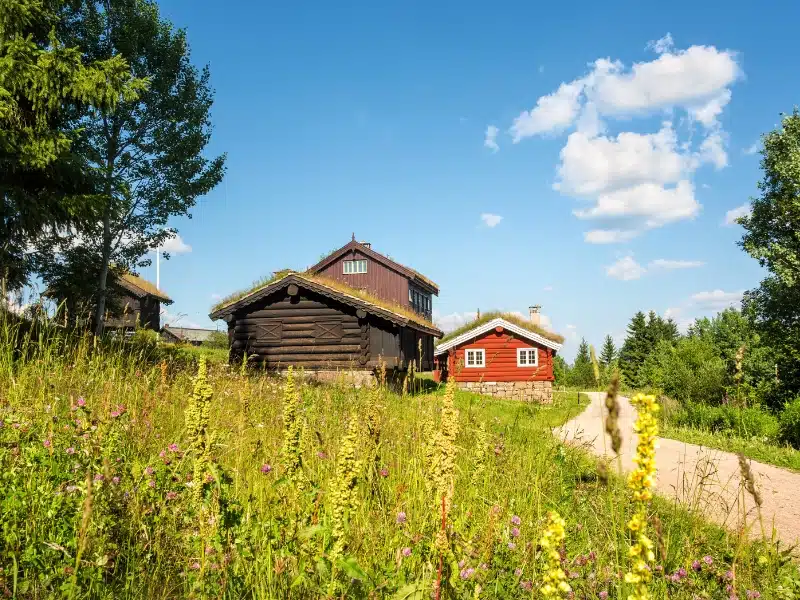
Visit the Botanical Garden
With free admission, the Botanical Garden in Toyen spans 6.5 hectares and holds the distinction of being Norway’s oldest. The gardens boast a charming arboretum filled with lush trees, an enchanting fragrance garden, a miniature mountainous terrain, a Victorian glasshouse, and a captivating array of rare specimens sourced from the Oslo fjords, four of which teeter on the brink of extinction in their natural habitat.
Make sure to find the woven sculptures crafted by the talented British artist Tom Hare, or simply enjoy a stroll, relax beneath the shade of a tree, and perhaps indulge in a cup of coffee from the Handwerk Café.
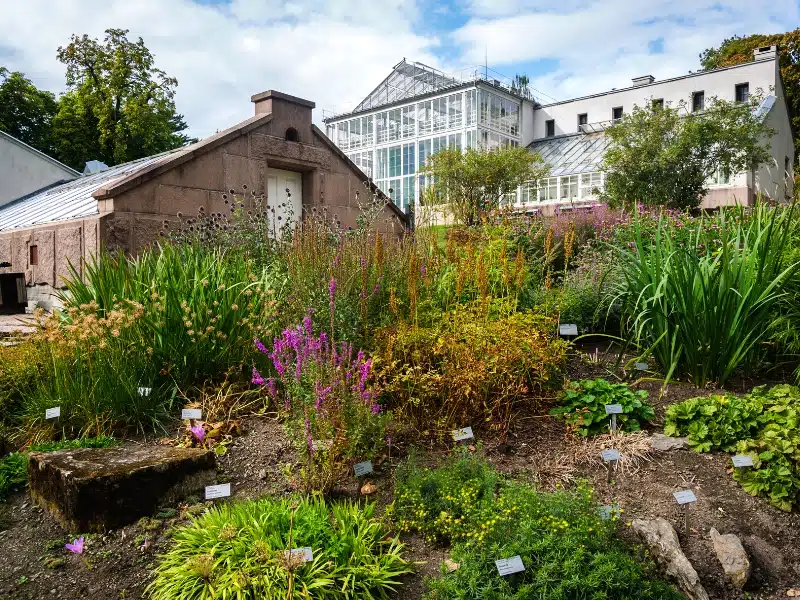
When to Visit Oslo
Summer
Oslo is a beautiful city to visit year-round. The summer months are mild, with long daylight hours and warm, sunny weather typical of the region, but mobs of visitors descend upon Norway’s many sought-after tourist destinations.
Spring & Fall
Shoulder seasons of spring or autumn are ideal for temperate weather in Norway’s capital city. Not as cold as winter, though not as balmy as summer, there are fewer tourists, giving you better visiting conditions and hotels and airlines lower their prices accordingly.
Winter
Winter is a marvelous time for 1 day in Oslo. You’ll get snowy, sparkly weather, almost no tourists, and bottom-of-the-barrel prices. Winter is cold, of course, and the days can be quite short, but if you layer accordingly, nothing beats the Norwegian capital in the wintertime.
A common misconception about the region is that it is ‘dark all the time’ in winter. While the days are certainly shorter, it is by no means dark 24 hours a day.
In fact, the sun rises at around 9am and starts to set at around 4pm, which is plenty of time for daytime activities, especially if you include dawn and dusk. Lastly, this type of soft winter light is excellent for photos!
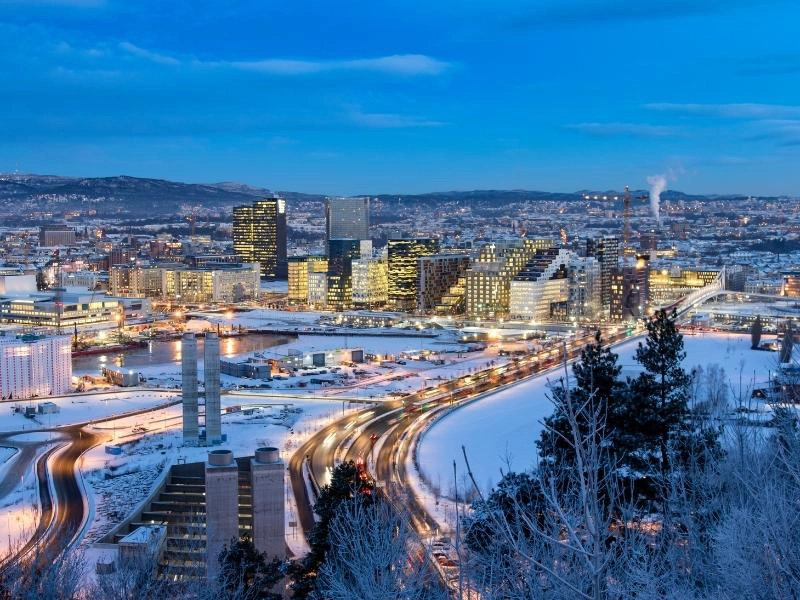
Getting to Oslo Norway
When flying to Oslo, you have the choice of two airports, Oslo Airport Gardermoen is 47km from the city, it is the main international airport, and all the major airlines land here. Alternatively, Torp Sandefjord Airport is 110km from the city and is where several of the low-cost carriers land.
The quickest and cheapest way to get into Oslo from Airport Gardermoen is on the FlytoGet Airport Express train to Oslo Central Station. The trains leave the airport every 10 minutes and the journey is approximately 20 minutes.
Alternatively, you can get the Flubussen bus, which leaves the airport every hour and takes about 45 minutes to get to the city. The best way to pay for your tickets would be to pre-purchase an Oslo Card, which includes free public transport in the city and free entry into many of Oslo’s attractions.
From Sandefjord Airport the best way to get to Oslo is by train, you will need to catch a shuttle bus from the airport to Torp station where you can catch a Vy Train. The shuttle bus takes 8 minutes to the station and the train journey is 1.5 hours to Olso city centre. You can check the timetables and prices for the trains here.
For a great way to start your Oslo trip book a private transfer from the airport with Intui directly to your accommodation in the city center – it’s more cost-effective than you think! Intui works with a large range of local operators to bring the best options and prices for your transfer.
Are you visiting Oslo as part of a longer trip? A Norway road trip is the best way see this stunning country, and our guide to road tripping in Norway has all you need, including maps, routes, highlights and tips, to help you plan the perfect trip.
Where to Stay in Oslo
Luxury: Amerikalinjen – Booking.com | Agoda
This historic and award-winning hotel offers an eclectic mix of Norwegian design classics, modern comfort, and a rich history, plus it’s located right in the city center making it a great choice for your Oslo trip.
Mid-Range: Clarion Hotel The Hub – Booking.com | Agoda
Our favorite hotel in Oslo for its great location close to Karl Johans Gate and its stylish decor. We also liked the restaurant and terrace on the top floor and the excellent Scandinavian inspired breakfast, just what we needed before a day of sightseeing!
Budget: Citybox Oslo – Booking.com | Agoda
This excellent budget hotel is well located and offers a simple self-check-in and small but perfectly formed rooms with comfortable beds and everything you need.
Hostel: Anker Hostel – Booking.com | Agoda
Close to Oslo Central Station, Anker Hostel offers clean and simply decorated studios and apartments with small kitchens and private bathrooms.
Written for The Gap Decaders by Tegan of Why Not Walk?
Are you looking for more one day city itineraries? Check out these top posts…
One Day in Dublin: Best Itinerary, Map, Tips & Guide
Berlin in One Day: Best Itinerary, Map, Tips & Guide
One Day in Munich: The Best Itinerary + Map, Tips & Guide
One Day in Venice: Best Itinerary, Map, Tips & Guide
The Best Prague One Day Itinerary + Map, Tips & Guide
One Day in Palermo: Best Itinerary, Map, Tips & Guide
Love it? Pin it!
